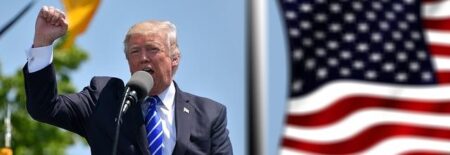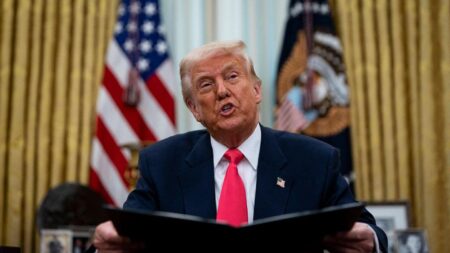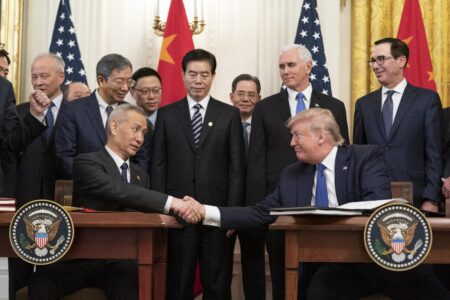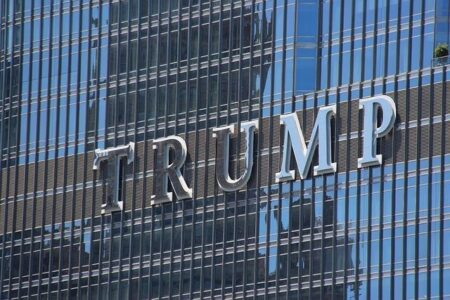Subscribe to Updates
Get the latest creative news from FooBar about art, design and business.
Browsing: trade policy
Despite President Trump’s decision to postpone tariffs on various imports from Canada for a month, Canada will maintain its own tariffs on U.S. goods. This development highlights ongoing trade tensions between the two nations as negotiations continue.
The U.S. has enacted new tariffs on imports from Canada and Mexico, alongside increased tariffs on Chinese goods. This move, outlined by the law firm Clark Hill, aims to address trade imbalances and bolster domestic industries amid ongoing economic tensions.
Former President Donald Trump has suggested potential tariffs on Canadian dairy and lumber products, warning that they may be imposed soon. This announcement signals a renewed focus on trade tensions between the U.S. and Canada.
In response to U.S. tariffs imposed by the Trump administration, Canadians are strategizing innovative solutions to mitigate economic impacts. From diversifying trade partnerships to advocating local production, these efforts reflect a resilient spirit in the face of protectionism.
Amid escalating tensions, Huawei’s DeepSeek AI technology faces stringent U.S. export controls, reshaping the competitive landscape of AI between the U.S. and China. This strategic maneuvering highlights the growing importance of technological dominance in global power dynamics.
In a recent statement, Donald Trump announced a temporary halt on imposing new tariffs, underscoring their strategic importance in trade negotiations. While he recognizes their potential economic impact, he emphasizes that tariffs remain a critical tool for policy leverage.
Trade tensions escalate as President Trump threatens Canada with new tariffs on dairy and lumber, sparking concern among Canadian officials. In response, B.C. Premier John Horgan proposes tolls on truckers to mitigate potential economic impacts.
In response to escalating tensions in Trump’s trade war, Mexico, Canada, and China swiftly implemented new tariffs on U.S. goods. This retaliatory measure underscores the growing economic strain and uncertainty surrounding international trade relations.
In a recent move, Trump has paused certain tariffs on imports from Mexico and Canada, impacting various goods. Exemptions primarily include critical materials for manufacturing. Analysts speculate on potential trade negotiations and future tariff adjustments.
Commerce Secretary Lutnick announced that the majority of tariffs on Canada and Mexico are likely to be postponed by one month. This delay aims to facilitate ongoing trade discussions and mitigate potential economic impact on both nations.
Lululemon’s strategic sourcing and production practices position it to sidestep potential tariffs from Trump’s trade policies, while Canada Goose, reliant on U.S.-manufactured materials, may face rising costs. The differing approaches highlight contrasting challenges in today’s trade landscape.
As US-China trade tensions escalate, African nations find themselves at a crossroads. With both superpowers seeking influence, countries must navigate complex trade dynamics, potentially reshaping their economies and diplomatic relations in the process.
As trade tensions escalate under Trump’s tariff threats, Brazil’s bond market emerges as a potential haven for investors. With attractive yields and relative stability, it offers a compelling alternative amidst global economic uncertainty.
India may avoid the Trump administration’s tariffs set to begin on April 2, according to sources. Negotiations are ongoing, focusing on trade imbalances and tariffs on Indian goods, potentially allowing for exemptions or reduced rates.
In response to President Trump’s tariffs, Canada and China have announced retaliatory measures, raising concerns of an escalating trade war. Both nations aim to protect their economies as tensions heighten in global trade relations.
China has implemented a ban on imports of Illumina’s gene sequencing machines, shortly after the U.S. reinstated tariffs on certain products. This move highlights escalating tensions between the two nations in the field of biotechnology and trade.
Trump’s tariffs have ignited a wave of anger and retaliation among trading partners, fueling market unease. As nations respond with their own tariffs, analysts warn of potential disruptions in global trade and the economic ramifications that could follow.
Global stock markets took a hit as President Trump announced new tariffs on Canada, Mexico, and China, escalating trade tensions and raising concerns about potential economic repercussions. Investors reacted swiftly, driving down major indices.
In light of recent statements by Lutnick, speculation is mounting around a potential tariff deal between Canada and Mexico. Market analysts will keenly monitor financial markets for reactions, particularly in sectors heavily reliant on cross-border trade.
Javier Milei’s recent visit to Washington underscores his commitment to promoting freer trade between the U.S. and Argentina. Such a shift could enhance economic ties, boost exports, and foster investment, potentially benefiting both nations’ economies.






















